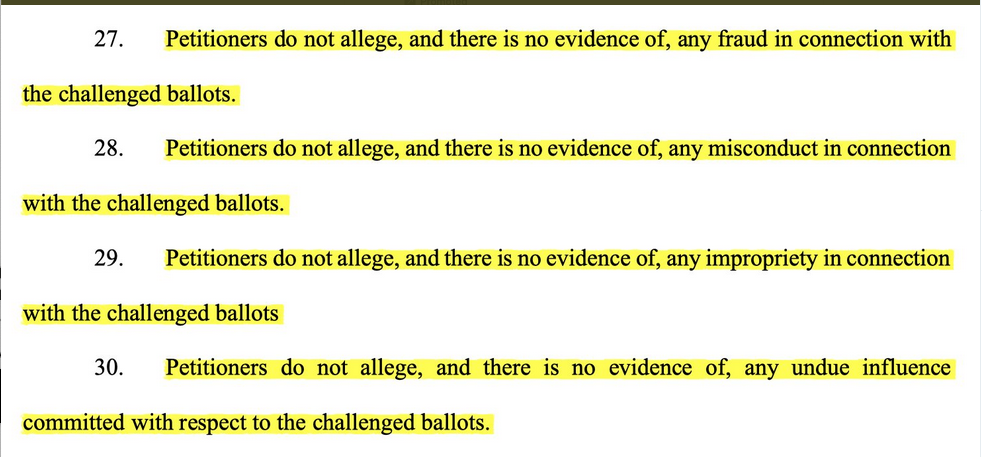President Donald Trump has asked top aides about a wild plan that involves replacing electors in swing states with loyalists to secure himself a second term, The New York Times reported on Thursday.
The plan hinges on Republican state legislatures deciding to ignore the states’ results and instead send a new group of electors to the Electoral College who would cast their votes for Trump.
Such a plan, while technically possible, has been widely dismissed by experts as unworkable in practice and an affront to US democracy. Business Insider’s report noted some of the problems with making it work.
Citing sources familiar with Trump’s activities, The Times reported that the president pressed his advisors about the plan at a meeting on Wednesday.
“It was not a detailed conversation, or really a serious one,” and did not reflect any “obsessive desire” of Trump to remain in office, the report described the sources as saying.
He has spent time playing golf, watching cable news, and tweeting accusations of electoral fraud, many of which Twitter has labeled misleading.
The White House did not immediately respond to a request for comment.
At a meeting on Wednesday at the White House, President Trump had something he wanted to discuss with his advisers, many of whom have told him his chances of succeeding at changing the results of the 2020 election are thin as a reed.
He then proceeded to press them on whether Republican legislatures could pick pro-Trump electors in a handful of key states and deliver him the electoral votes he needs to change the math and give him a second term, according to people briefed on the discussion.
It was not a detailed conversation, or really a serious one, the people briefed on it said. Nor was it reflective of any obsessive desire of Mr. Trump’s to remain in the White House.
“He knows it’s over,” one adviser said. But instead of conceding, they said, he is floating one improbable scenario after another for staying in office while he contemplates his uncertain post-presidency future.
There is no grand strategy at play, according to interviews with a half-dozen advisers and people close to the president. Mr. Trump is simply trying to survive from one news cycle to the next, seeing how far he can push his case against his defeat and ensure the continued support of his Republican base.
By dominating the story of his exit from the White House, he hopes to keep his millions of supporters energized and engaged for whatever comes next.
The president has insisted to aides that he really defeated Joseph R. Biden Jr. on Nov. 3, but it is unclear whether he actually believes it. And instead of conducting discreet requests for recounts, Mr. Trump has made a series of spurious claims, seizing on conspiracies fanned on the internet.
The latest was on Thursday, when he falsely claimed on Twitter that Dominion voting machines switched hundreds of thousands of his votes to Mr. Biden, citing a report he had seen on the fringe network OANN, something even his supporters called ridiculous and a federal agency overseeing cybersecurity disavowed in a statement.
Advisers said his efforts were in keeping with one of his favorite pastimes: creating a controversy and watching to see how it plays out.
As a next step, Mr. Trump is talking seriously about announcing that he is planning to run again in 2024, aware that whether he actually does it or not, it will freeze an already-crowded field of possible Republican candidates. And, Republicans say, it will keep the wide support he showed even in defeat and could guarantee a lucrative book deal or speaking fees.
In the meantime, Mr. Trump has spent his days toggling between his White House residence and the Oval Office, watching television coverage about the final weeks of his presidency. His mood is often bleak, advisers say, though he is not raising his voice in anger, despite the impression left by his tweets, which are often in capital letters.
But the work of government has been reduced to something of a sideshow for the president. He has not made any public appearances except for a visit to Arlington National Cemetery on Veterans Day since an angry statement a week ago.
And he has not spoken about the coronavirus pandemic or mentioned it on Twitter despite the staggering growth in positive cases and the number of West Wing aides and outside advisers who have been diagnosed with the virus in the past week.
Several advisers have bluntly told Mr. Trump that the chances of changing the election’s outcome are almost nonexistent, including in a meeting with him on Saturday at the White House to which the president’s son-in-law, Jared Kushner, dispatched aides, even as he has generally backed Mr. Trump’s desire to keep fighting.
While most Republicans have declined to publicly oppose the president, more have become vocal that the time has come, amid the growing pandemic, to allow a transition to take place.
“Look, I’m worried about this virus. I’m not looking at what the merits of the case are,” said Gov. Mike DeWine, Republican of Ohio, about Mr. Trump’s lawsuits in an appearance on Thursday on CNN. “It would appear that Joe Biden is going to be the next president of the United States.”
Karl Rove, the architect of President George W. Bush’s presidency and an informal adviser to Mr. Trump, wrote in The Wall Street Journal on Wednesday that “closing out this election will be a hard but necessary step toward restoring some unity and political equilibrium.”
He added that after Mr. Trump’s “days in court are over, the president should do his part to unite the country by leading a peaceful transition and letting grievances go.”
A peaceful transition is not as much on Mr. Trump’s mind right now as settling scores both inside and outside the administration.
White House advisers have sent warnings to any government employees who might be looking for other jobs, have placed loyalists in the upper ranks of the Pentagon, and have been open to calls for intelligence officials to declassify documents related to the investigation into a possible conspiracy between the Trump campaign in 2016 and Russian officials.
And the president is considering firing the C.I.A. director, Gina Haspel, although some administration officials said he may not go through with it.
The president has nursed a burning anger at Fox News for calling Arizona for Mr. Biden on election night, and has entertained suggestions from allies to start some kind of competing conservative-leaning news network, whether by trying to join forces with an existing property like OANN or Newsmax, or forming a digital network of his own, as Axios reported. (The New York Times called Arizona for Mr. Biden late Thursday.)
In a tweet on Thursday, Mr. Trump continued his attacks on his once loyal supporters, declaring falsely that Fox News’s “daytime ratings have completely collapsed.”

